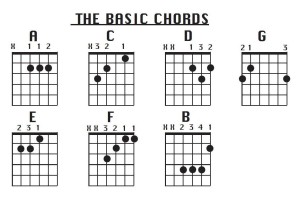Learning to play acoustic guitar over the summer was a lot of fun and provided me with my new favorite hobby. When I was learning the basic chords, it was easy to tell when I got it right and even easier to hear when I got it wrong. My questions I wanted answered was what makes chords sound pleasant to ear and other combinations of notes unpleasant.

In a study done at Minnesota University, 250 college students were played sounds and asked their preferences of them. The study was set out to answer my question better than it had been answered previously: “What makes certain combinations of musical notes pleasant or unpleasant?” Chords and their frequencies and frequency intervals were manipulated and played. The study concluded that the chords sounded good only if harmonically related. I learned that harmonic chords are a combination of sounds with frequencies that are multiples of a fundamental frequency. For example, 150, 200, 250, and 300 are all multiples of the base frequency of 50. The study also found that non-harmonica chords which have beating, or notes with frequencies too close together that buzz are unpleasant to people’s ear. Another finding was that the chords found in people’s native music were given higher ratings.
However another study was skeptical of the fact that buzzing was what made the chords unpleasant. This study took people who were unable to detect beating (buzzing of notes) and played them a variety sounds like the previous one. The interesting finding was that these people disliked the non-harmonious sounds just as much as people who could hear the beating. This means that the buzzing from beating in non-harmonious is not the most important factor or perhaps not a factor or all in why we do not like them. Though not entirely proven, this suggests that our ear structure and/or brain are specifically designed to accept frequencies in equal intervals. We know our inner ear and brain have auditory nerves that accept and transfer sounds to the brain. We know that the sounds are combined to make a comprehendible and meaningful sound. Mark Tramo is continuing research into what part of the auditory cortex actually compiles these sound bytes.
I thought that after this research I could explain what makes chords sound good to my ear. It’s the fact that the notes are harmonious. It makes sense to me that by fretting a string incorrectly would make two notes in the chord too close to each other which is not pleasant to the ear. I would hope that research is conducted on what biologically makes these even ratios pleasant and more receivable. For the time being, it is positive to have gained knowledge on what makes certain notes sound good together as I continue to learn about music.
Works Cited:
http://www.wired.com/2012/11/human-brain-harmony
http://www.sciencedaily.com/releases/2010/05/100520131431.htm
http://www.ncbi.nlm.nih.gov/pmc/articles/PMC2885564/
http://news.harvard.edu/gazette/1997/11.13/HowYourBrainLis.html


This is great! I’ve never came across this question and I play guitar and piano. I taught myself by ear so all I was every really going off of was the sound of different notes combined. I knew what sounded good and what didn’t but I never exactly knew why one combination would sound better. The explanation is pretty inarguable, the notes are harmonic and thats what makes it sound good. But now that you have asked the question I am also wondering, biologically what makes one sound more enjoyable than another?